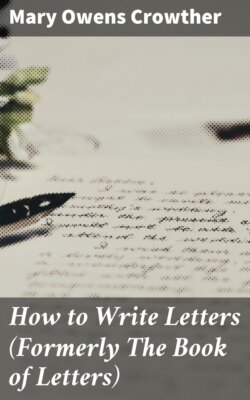Читать книгу How to Write Letters (Formerly The Book of Letters) - Mary Owens Crowther - Страница 33
На сайте Литреса книга снята с продажи.
Commom Offenses
ОглавлениеTable of Contents
Under this head are grouped a few of the more common offenses against good form in letter writing; some of these have been touched on in other chapters.
Never use ruled paper for any correspondence.
Never use tinted paper for business letters.
Do not have date lines on printed letterheads. This of course has to do with business stationery.
Do not use simplified spelling, if for no other reason than that it detracts from the reader's absorption of the contents of the letter itself.
"Enthuse" is not a word—do not use it.
Avoid blots, fingermarks, and erasures.
Do not use two one-cent stamps in place of a two-cent stamp. Somehow one-cent stamps are not dignified.
Never use "Dear Friend," "Friend Jack," "My dear Friend," or "Friend Bliss" as a form of salutation. In the case of a business letter where a salutation for both sexes may be necessary, use "Gentlemen."
Never cross the writing in a letter with more writing.
Never use "oblige" in the place of the complimentary close.
Do not double titles, as "Mr. John Walker, Esq." Write either "Mr. John Walker" or "John Walker, Esq."
A woman should never sign herself "Mrs." or "Miss" to a social letter. In business letters (See Chapter 3) it may be necessary to prefix "Mrs." or "Miss" in parentheses to show how an answer should be addressed to her.
Never omit "Yours" in the complimentary close. Always write "Yours sincerely," "Yours truly," or whatever it may be. Never write a letter in the heat of anger. Sleep on it if you do and the next morning will not see you so anxious to send it.
In some business offices it has become the custom to have typed at the bottom of a letter, or sometimes even rubber-stamped, such expressions as:
Dictated but not read.
Dictated by but signed in the absence of——.
Dictated by Mr. Jones, but, as Mr. Jones was called away, signed by Miss Walker.
While these may be the circumstances under which the letter was written and may be necessary for the identification of the letter, they are no less discourtesies to the reader. And it cannot improve the situation to call them to the reader's attention.
In the matter of abbreviations of titles and the like a safe rule is "When in doubt do not abbreviate."
Sentences like "Dictated by Mr. Henry Pearson to Miss Oliver" are in bad form, not to speak of their being bad business. They intrude the mechanics of the letter on the reader and in so doing they take his interest from the actual object of the communication. All necessary identification can be made by initials, as: L. S. B.—T.
Do not write a sales letter that gives the same impression as a strident, raucous-voiced salesman. If the idea is to attract attention by shouting louder than all the rest, it might be well to remember that the limit of screeching and of words that hit one in the eye has probably been reached. The tack to take, even from a result-producing standpoint and aside from the question of good taste, is to have the tone of the letter quiet but forceful—the firm, even tone of a voice heard through a yelling mob.
Do not attempt to put anything on paper without first thinking out and arranging what you want to say.
Complimentary closings in business letters, such as "Yours for more business," should be avoided as the plague.
